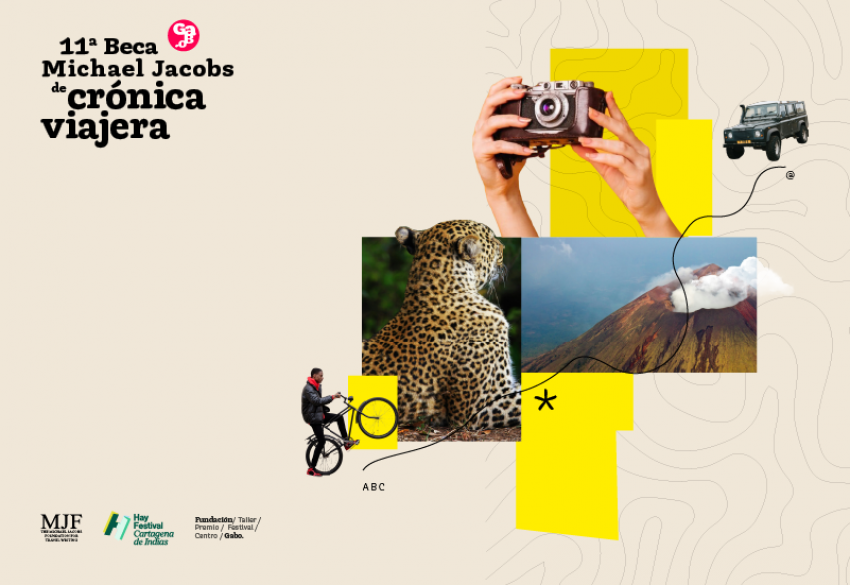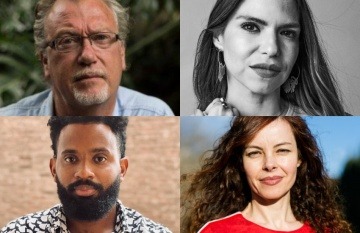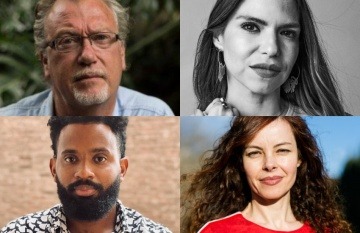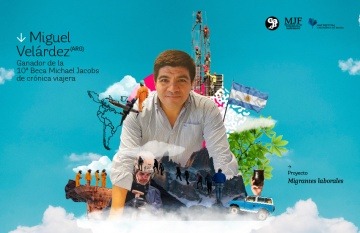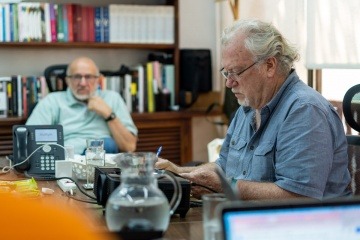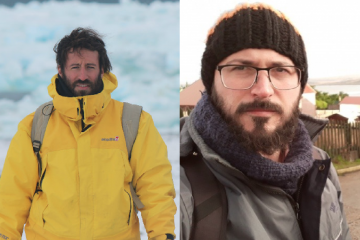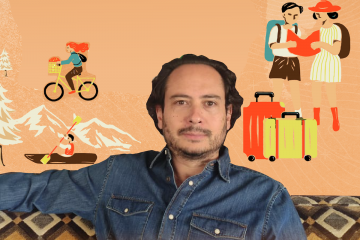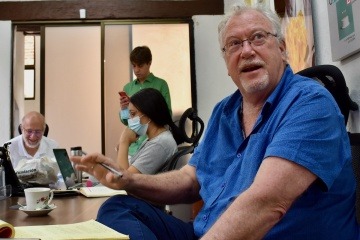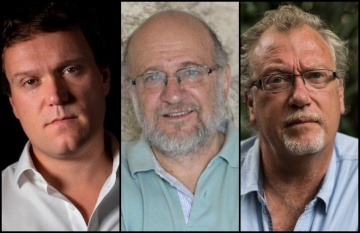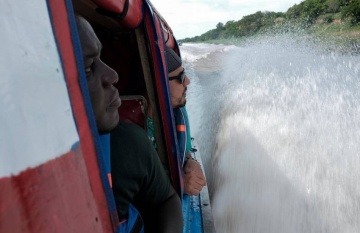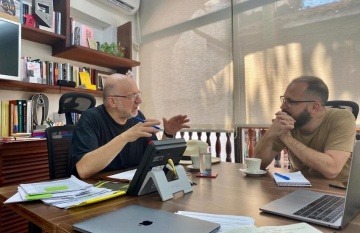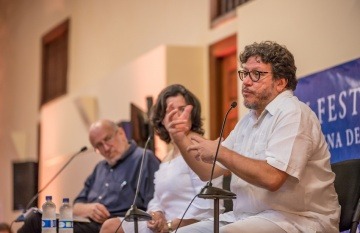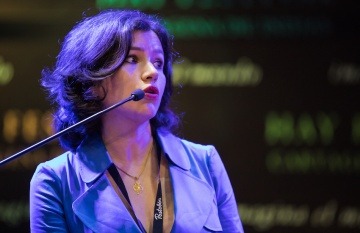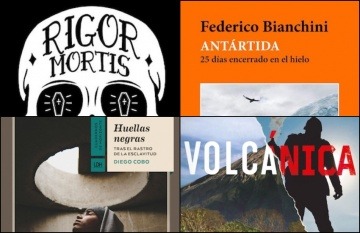Following Michael Jacobs' passing in 2014, the Gabo Foundation and the Hay Festival Cartagena de Indias established the Michael Jacobs Travel Writing Grant. The call for entries for the 2025 edition has now been launched, funded by the Michael Jacobs Foundation for Travel Writing, a non-profit organization founded by Michael's widow and brother to honor his legacy and promote travel writing in Spain and Latin America.
Apply here
The grant, now in its 11th edition, aims to encourage travel chronicles and will award US$10,000 for a book project or travel article about Latin America or Spain, to be published in Spanish or English.
The jury will consider the narrative quality and journalistic depth of the projects when selecting the winner. For Michael Jacobs, travel journalism went beyond mere anecdotal experiences; therefore, we are seeking projects with the potential to engage the five senses and open the reader’s mind.
The official announcement of the winner will be made at the Hay Festival Cartagena de Indias 2025, taking place from 30 January to 2 February 2025.
» The Grant
The recipient will receive 10,000 US dollars to finance the research and writing of their article or book. This amount includes any applicable taxes to be paid by the beneficiary and the sponsoring institutions. The grant will be distributed as follows: the first half ($5,000) upon the announcement of the winner, and the remaining half ($5,000) upon the project's completion and submission for publication.
The winner will also be invited to serve as a judge for the next edition of the Michael Jacobs Travel Writing Grant.
» How to Apply
To apply for this grant, you must complete the registration form by 11:59 p.m. (Colombian time) on December 1st, and include the following information with your application:
a. A detailed presentation of the project (article or book), including: a description of the project and a sample of the work of at least 1,500 words to evaluate the author's narrative ability.
b. An autobiography of no more than 500 words (in Spanish or English) describing your experience as a travel journalist and your motivation for applying for the grant. Traditional resumes or CVs will not be considered.
c. One piece of writing published by the author in print or digital media (in English or Spanish). Applicants must have published at least one article or book at the time of application.
d. The submitted work must focus on travel journalism in Latin America or Spain. The language of the work may be Spanish or English, and journalists or writers of any nationality may apply.
Important: The project does not need to be fully completed, as the grant is intended to support an ongoing project. However, when presenting the project, the applicant should provide evidence of having researched or investigated the location they wish to report on.
» The Jury
Teresita Goyeneche (Colombia)
Teresita is an internationalist from Universidad del Norte and holds a master’s degree in creative non-fiction writing from Columbia University. She is involved in social and cultural promotion and writes chronicles, columns, and personal essays.
She has worked with organizations such as Fundación Leo Espinosa and Fundación Gabo, and has contributed to media outlets including El Malpensante, Vice en Español, Revista Fucsia, Columbia Journal, and Univision. In 2017, Teresita was a finalist for the Inter American Press Association (IAPA) Awards for Excellence in Journalism in the Chronicle category and was a 2018 Gabo Fellow. She is currently an associate manager at Mutante and the author of La personalidad de los pelícanos (2022).
Mar Abad (Spain)
Mar is a journalist and writer, as well as the editorial director and co-founder of the podcast label El Extraordinario. She is the author of Romanones, una zarzuela del poder en 37 actos (Libros del K.O.), Antiguas pero modernas (Libros del K.O.), El folletín ilustrado (Lunwerg), and De estraperlo a postureo (Larousse).
She has received several awards, including the Archiletras de la Lengua Award (2022), ForoTransfiere Journalism Award for Science and Technology Communication (2022), Don Quijote Journalism Award (2020), Miguel Delibes Award (2019), Colombine International Journalism Award (2018), and Accenture Journalism Award (2017) in the Innovation category.
Sabrina Duque (Ecuador)
Sabrina is a journalist, chronicler, and translator whose stories have been translated into Portuguese, Italian, and English. In 2015, she was a finalist for the Gabo Award in the Text category for her profile Vasco Pimentel, el oidor. In 2018, she received the Michael Jacobs Travel Writing Grant. Her essay Is There Life After Maracanã? appears in the book Eduardo Galeano, an Outlaw in Paradise. She has authored the books Lama (Turbina, 2017), VolcáNica (Debate, 2019), and I Need to Know About Your Life Today (Anagrama, 2022). As a contributor to The New York Times in Spanish, she also edits the El Times newsletter.
Jon Lee Anderson (United States)
Jon began his journalism career in Peru in 1979 as part of The Lima Times weekly. Since then, he has specialized in Latin American politics and modern conflicts, including Afghanistan and Iraq. He is renowned for his profile writing, having portrayed major global figures such as Fidel Castro, Gabriel García Márquez, Augusto Pinochet, King Juan Carlos I of Spain, and Hugo Chávez. His books include Che Guevara: A Revolutionary Life (1997), The Lion's Grave: Dispatches from Afghanistan (2002), and The Fall of Baghdad (2004). He has also written for The New York Times, Financial Times, The Guardian, El País, and Harper's Magazine.
In 2013, Jon received the Maria Moors Cabot Award, granted annually by Columbia University. Since 2000, he has been a teacher at Fundación Gabo and, since 2014, a member of the jury for the Michael Jacobs Travel Writing Grant.
Miguel Velárdez (Argentina)
Miguel is a journalist and journalism professor from Tucumán, Argentina. He first contributed to La Gaceta in 1995 and officially joined the newspaper in 1997. Over the course of 25 years, he worked across several sections, including Politics, Crime, Travel, and the digital edition. His work has appeared in Brando magazine and Tucumán Zeta, with other pieces published in Relatos Infieles, a tribute to Tomás Eloy Martínez. In 2022, he won first prize in the Relatos sobre Malvinas contest, commemorating 40 years since the Falklands War. He has been a fellow at the Institute of the Americas (San Diego, USA) and the Gabo Foundation, which awarded him the 2024 Michael Jacobs Travel Writing Grant.
» About Michael Jacobs
"Travel literature can enhance our understanding of the world in a unique way. Having the potential to span so many different forms of writing— from fiction to autobiography, from journalism to history— it allows authors to explore ideas and disciplines with a freedom that wouldn’t be possible within a more academic context."
This is how Michael Jacobs described the great passion that consumed much of his life: travel writing. Born in Italy in 1952, Jacobs spent his youth in England before embarking on travels across the world, particularly Spain and Latin America, where he gained renown for his work. He became a notable Hispanist and a passionate devotee of Spanish culture.
Although he studied art history at the Courtauld Institute, Jacobs chose to leave that career behind to become a full-time writer. After publishing several books on art, he turned his attention to Andalucía, a region that inspired his first travel book. He later settled in the small town of Frailes, in Jaén province, which became the subject of The Factory of Light: Tales from My Andalucian Village, a memoir of his first five years in the village of two thousand inhabitants.
In 2003, Jacobs wrote Ghost Train Through the Andes, a chronicle of his journey through Chile and Bolivia, tracing the path of the train on which his grandfather worked between Antofagasta and Potosí, leading to Cochabamba.
Jacobs' connection to the Spanish-speaking world was so strong that the small town of Frailes became his own "Macondo." His life was forever marked by his meeting with Gabriel García Márquez at the Cartagena Hay Festival. Their conversation centered on García Márquez’s memories of the Magdalena River, a subject that had long fascinated Jacobs. This encounter inspired him to embark on a journey along the Magdalena, which he documented in The Robber of Memories, his final completed book. This work not only captures the significance of Colombia’s most important river but also serves as a reflection on Jacobs’ relationship with his parents and his childhood.
Today, Michael Jacobs is recognized as a global authority in travel writing, with his works firmly established within the genre’s canon. He passed away in London on January 11, 2014, leaving behind an unmatched and evocative legacy.
» Selected Bibliography
- Andalusia
- Between Hopes and Memories: A Spanish Journey
- In the Glow of the Phantom Palace: Travels between Granada and Timbuktu
- The Factory of Light: Tales from My Andalucian Village
- Ghost Train Through the Andes
- The Robber of Memories
» Winners of the Michael Jacobs Travel Writing Grant
2024 - Miguel Velardez (Argentina)
Labor Migrants
The author proposes a book focused on workers from all over Argentina and neighboring countries who seek employment in the remote province of Santa Cruz, located in Argentine Patagonia.
2023 - Abraham Jiménez Enoa (Cuba)
Landing in the World
For Jiménez Enoa, Landing in the World is a travel project through the Western cities where he lived during his first year outside of Cuba. It is also a journey from the present to the past, as everything that happens in his new life as an exile is "a reminiscence of his past on the island." “The journey is not a tourist trip; it’s not an effort to discover these cities. It’s my life on a journey,” writes the journalist in his proposal.
2022 - Federico Guzmán (México)
There Is Such a Place: A Journey to the Ruins of Latin American Utopias
For Guzmán Rubio, this journey is both geographical, temporal, as well as ideological, tracing Latin America's efforts to create ideal communities where people could live in peace, prosperity, and harmony. His exploration covers places like Michoacán (Mexico), Isla Martín García (Argentina), Paraná and Santarém (Brazil), Solentiname (Nicaragua), and Santa Fe (Mexico). Through this, the author aims to highlight a rarely explored side of Latin American history—its most generous and devastating dreams that sought to become reality.
2021 - Santiago Wills (Colombia)
The Shadow of the Jaguar: Capturing the Spirit of the Americas
For Santiago Wills, this project is an opportunity to materialize, in a non-fiction book, the omnipresence of the jaguar across the continent—its life and its relationship with the places and people around it. Wills aspires to create a work that helps readers understand the life of the jaguar and how its existence has transformed the people who share its territories.
2020 - J. S. Tennant (England)
Mrs Gargantua and the Idea of Cuba
A book that eschews the often over-exoticised narratives to give an unconventional, deeply researched meditation on the revolutionary island of Cuba and its relationship with the outside world. Combining travel, history, biography and reportage, the author reveals an island that has too often been, to outsiders, an imagined or fantastical space, as much as a real one. From Columbus’ distortions to the Missile Crisis, the Castros and Guantanamo, the book reveals previously unknown aspects of the country and explores its enduring ability to harbor secrets.
2019 - Ernesto Picco (Argentina)
Dreaming of the Islands: A Chronicle of the Falklands Beyond the War
This book invites readers to immerse themselves in the reality of the islands and explore what life is like on this small archipelago lost in the Atlantic. It reveals who its inhabitants are, their stories, and what remains of the war that left more than 900 dead.
2018 - Sabrina Duque (Ecuador)
VolcáNica, Chronicles from a Country in Eruption
Sabrina Duque explores the fierce spirit of the Nicaraguan people through their relationship with the country's volcanoes. Initially focused on how Nicaraguans live alongside these volatile natural forces, Duque’s project shifted dramatically when, in April 2018, political unrest erupted in the streets. As the revolution of the "grandchildren of Sandinismo" unfolded and the death toll mounted, Duque found herself chronicling not just the country's geological volatility but its social upheaval. The book intertwines Nicaragua's ever-present flirtation with danger and its sudden descent into violent unrest, offering a vivid portrait of a people who, like their volcanoes, simmer beneath the surface before erupting with force.
2017 - Diego Cobo (Spain)
Black Footprints: The Trail of Slavery
This journalistic project is a series of reports on the aftermath of the African slave trade in places like Gambia, Jamaica, Colombia, and Cuba.
2016 - Federico Bianchini (Argentina)
Antarctica, 25 Days Trapped in Ice
Reaching Antarctica is difficult, but leaving is even harder. Bianchini narrates the unique life of the men and women engaged in research activities at one of Argentina's bases on this frozen, untouched continent. What was supposed to be a stay of less than a week turned into nearly a month of isolation. The book was published in 2017 by Editorial Tusquets.
2015 - Álex Ayala Ugarte (Spain)
Rigor Mortis: Normality is Death
Comprising 16 stories, this book traces the footsteps of death. From the Chaco region to the waters of Lake Titicaca, Ayala draws on everyday situations to craft an intimate portrait of Bolivian society. The book was published in 2016 by Editorial El Cuervo.
